Parallels: A Star Trek Reflection
Science fiction — or something more?
Before we go too far, let me say this clearly:
This is not a Star Trek hit piece — I’m actually a huge fan.
From an entertainment point of view, I’ve always found the series captivating — especially The Next Generation and many of the series and spin offs that followed.
What follows isn’t an attack on the franchise. It’s a personal reflection. A closer look at the future it portrayed — and the one we may already be living in.
And yes, I’m asking a little indulgence from the non-Trekkies out there. Even if you’ve never seen an episode, I think you’ll still find this… oddly relevant.
So, get ready to take your mind to the final frontier.
To explore strange new thoughts, to seek out new perspectives.
To boldly go where it’s never gone before.
My Personal Connection
When I was younger, Star Trek seemed like the most optimistic vision of the future I’d ever seen. Not just in its tone — though that certainly helped — but in its sense of clarity and freedom.
As someone drawn to engineering and technology, I was captivated by the tools and ideas the show put on screen.
In the ’80s, when very little technology existed, I found myself imagining a world where we had access to the tech Star Trek portrayed:
mobile tablet devices, computers you could talk to, artificial intelligence.
These weren’t just props — they were prototypes. The future they depicted didn’t just feel possible; it felt inevitable. And while we still can’t jump to warp, much of the technology has quietly stepped off the screen and into our lives.
Back then, I wasn’t watching for political ideals like “a united humanity” or “the end of poverty.”
I watched it for the tech. The story lines. The time travel.
The paradoxes. The ideas. The imagination.
The sense of duty to something greater than yourself.
That’s what drew me in.
But looking back now — and watching where our real-world trajectory is heading
— I can’t help but see it all a little differently.
Fiction as Prototype
One thing I’ve come to understand:
Fiction has always been used to prototype the future.
Not just imagine it — but sell it.
Star Trek gave us a prototype. A world where conflict had been all but erased. Where governments are planetary, not national. Where people are assigned roles, not born into them. Where a single ideology, a single set of values, and a single vision for humanity is enforced through structure, consensus, and surveillance.
And like all good prototypes, it was introduced through fiction — where mental and moral resistance is low, because it’s not real.
Our defences are down. We’re not questioning motives or policies — we’re immersed in the storyline. We’re open to wherever the writers want to take us, and in many cases, we’re begging them to keep us hooked as a distraction from the pressures of our daily lives.
But what we don’t realise is that even fiction leaves residue.
Ideas go in — and parts of them stick.
The Federation Template
The United Federation of Planets is presented as a utopia — the culmination of human evolution, post-scarcity economics, and global unity. But let’s strip away the glow of nostalgia and take a clearer look.
This isn’t a vision of diversity. It’s uniformity.
This isn’t a future of freedom. It’s management.
This isn’t the decentralisation of power. It’s total consolidation.
Below are some of the most striking parallels between the Federation ideal and the system quietly being assembled around us.
Global unity at the expense of national sovereignty
In Star Trek, Earth is no longer a planet of nations — it’s a single unified entity.
Flags, borders, and national identities have disappeared, folded into the Federation. At first glance, that sounds like peace. In reality, it’s control.
There’s no real choice when there’s only one voice.
Today’s push toward global governance — through the UN, WEF, WHO, and other unelected bodies like the EU — mirrors this.
National sovereignty is being whittled away, replaced with treaties, directives, and frameworks that no one ever voted for.
The Federation model doesn’t just predict this — it normalises it.
The Illusion of Abundance
One of the more seductive traits of the Star Trek universe is its portrayal of limitless provision. Nobody wants for anything.
Food, housing, clothing, transport — all are available, all are free.
Replicators satisfy every need.
Money doesn’t seem to exist.
Greed and personal ambition have been engineered out of the human experience.
It sounds noble — until you realise the cost of such abundance is absolute dependence.
When everything is provided for you by the system, you’re no longer free — you’re sustained. And sustained on its terms.
Gratitude slowly replaces autonomy.
Compliance replaces risk.
Dissent becomes irrational when every material need is met.
Why complain about freedom when you’ve got everything you need?
We’re already living in the early prototype:
Social welfare, government funded health care, housing co-ownership — all policies that already align with this narrative.
You no longer own software — you subscribe to it.
Movies, music, and books? You lease access until the platform decides you can’t.
Cars are rolling out with features locked behind monthly payments.
Even farm equipment is moving to pay-per-use models, where “ownership” is subject to manufacturer permission.
This is life by subscription. A digital leash dressed up as convenience.
It’s the illusion of abundance — but with none of the freedom that true ownership brings.
You’ll own nothing — and be grateful for it — apparently.
The Four Pillars of Control
Surveillance — with your permission
In Star Trek, privacy barely exists. The computer hears everything. Sees everything. Knows everything. You’re monitored for your own good. Tracked for the sake of efficiency, health, and duty.
It’s not presented as surveillance.
It’s just… the way things are.
Sound familiar?
Today, under the banner of “safety” and “convenience,” we’re being offered digital ID systems, centralised medical records, smart homes, facial recognition —
all for our own good.
Except it’s not really offered, is it?
We’re being nudged. Incentivised. Eventually, coerced.
Not by guns — but by systems — and through social engineeering.
Welcome to the Federation — powered by Amazon, Google, and your Government of course. Even your government’s very own Ministry of Online Safety gets a seat at the table.
Faith — replaced by ideology
There’s no religion in Star Trek. No visible faith. No higher moral law.
The Federation stands in place of all that — a secular, progressive ideology that claims moral superiority and universal truth.
In the real world, we’re watching Christianity — and other traditional belief systems be slowly sidelined. Or not so slowly, depending on where you are in the world.
The new doctrines? Climate salvation, identity worship, safety absolutism.
The Federation doesn’t tolerate competing truths.
Neither does the modern technocratic state.
You can believe — as long as it's not the kind of belief that challenges theirs.
But what is safety absolutism, I hear you ask?
It’s the belief that safety — physical, emotional, psychological — should override all other considerations. Freedom. Truth. Risk. Conscience.
Even basic human interaction.
Everything becomes subject to one question: is it safe?
But Safety absolutism doesn’t stop at protecting people.
It begins to manage them. Restrict them. Silence them.
Until eventually, anything that challenges the system is treated as a threat.
Under this new doctrine, harmful and dangerous no longer mean a form of violence — they simply mean non-compliant.
And the solution is always more control.
Family is absent — or absorbed
How many stable, present families do you see in Star Trek? Almost none.
Characters are often rootless. Children are raised communally. Biological bonds are replaced with team allegiances or mentorship.
In today’s world, we’re watching the same erosion:
State systems step in where parents once stood.
The idea of mother and father is reframed as outdated.
Two incomes are now essential just to keep a roof overhead
— let alone food on the table.And of course, childcare is always available. Not because the state cares, but because they don’t want parents shaping their children’s worldview. That would waste a prime opportunity to feed them the “approved” narrative from the earliest possible age.
A strong family is a threat to any system that demands total loyalty.
A united family provides a competing centre of gravity — built on love, shared experience, and deep interdependence.
That’s why it must be weakened.
Nationhood erased — patriotism outlawed
There’s no patriotic fervour in Star Trek. No national holidays. No honouring of unique traditions. Earth is just one indistinct member of the greater Federation.
That’s the ideal: post-national identity.
But without nationhood, there’s nothing to fight for.
Nothing to defend. Nothing to belong to.
Today’s globalist vision mirrors it perfectly.
Erase borders, dilute traditions, make patriotism a dirty word.
We see it playing out now:
— The suppression and rewriting of colonial history.
— The quiet disownment of national days of commemoration.
— The hijacking of indigenous narratives for globalist agendas.
— Cultural erosion through unchecked mass immigration of incompatible cultures.
The result isn’t unity. It’s rootlessness.
And rootlessness doesn’t bind — it isolates, it scatters, it sets adrift.
Duty, Obedience, & Death of Conscience
One of the most celebrated traits in the Star Trek universe is duty. The officers of Starfleet are disciplined, principled, and deeply committed to their mission.
They serve without hesitation. Orders are followed. Protocol is respected. The system works because everyone believes in the cause.
It’s painted as noble — and in many ways, it is.
But stop and ask:
Duty to what?
Who defines the mission?
Who decides what’s right?
Because when duty becomes detached from conscience — from God, from truth, from any authority higher than the institution — it becomes something else entirely.
It becomes obedience.
And that’s the version of duty we see in Star Trek:
Unwavering service to the system itself.
The Federation is the moral compass.
It defines good. It defines evil.
It sets the mission.
Your job is to follow it — with honour, of course.
Real-world mirror:
The growing expectation that we will do what’s asked
— not because it’s right, but because it’s policy.Sign this. Accept that. Get the jab. Register the ID. Don't question the science.
Don’t challenge the narrative. Don’t hesitate.
You’re not forced — you’re simply told it’s the right thing to do
For the greater good of course.
And if you resist, you’re not just wrong — you’re selfish. Dangerous.
Non-compliance becomes a moral failing.
The entire framework shifts:
Conscience is replaced by compliance.
Groupthink is rewarded.
Virtue becomes following orders.
Dissent becomes disloyalty.
In this light, duty is no longer a personal commitment to higher values — it’s an administrative virtue.
You’re good if you conform.
You’re good if you obey.
You’re good if you don’t ask why.
And history has demonstrated — again and again — that when duty is stripped of conscience, the worst crimes are committed by people who were “just doing their job.”
Without conscience, we’re just cogs — useful, quiet, and compliant.
A Visual Plant
It’s worth pointing out that the logo of the Federation and that of the United Nations are eerily similar.
Same blue and white colour scheme. Same laurel wreath. Same central globe.
Coincidence? Maybe.
But visual language matters. It embeds. It imprints.
Over time, it makes the unfamiliar look familiar
— and that, in turn, makes it easier to accept.
The Moral Colonialism of the Future
This is one area I debated whether to include — but the more I thought about it, the more I realised it belongs here.
The Federation often presents itself as a force for good — spreading peace, enlightenment, and values across the galaxy.
But it does so by deciding who is ready, who is worthy, and who needs to be observed, managed, or gently steered.
It’s the same story we’ve seen play out in real life, again and again:
One dominant power — often the United States — claiming to be the bearer of democracy, showing up in foreign lands, and deciding what’s best for others.
These efforts are rarely framed as domination.
They’re called exporting democracy. Peacekeeping.
Different words — same playbook.
Straight from the soft-power propaganda manual.
This isn’t diplomacy.
It’s moral colonialism.
The Federation evaluates the locals, then decides if they’re ready to be included in “the future.”
And if they’re not?
They’re monitored. Managed.
Or quietly manipulated until they comply — or collapse.
It’s the story of building an empire — just with better branding.
“I’m from the government, and I’m here to help.”
That line should make your skin crawl — whether it’s coming from a House of Parliament, the White House or the bridge of a starship.
The Pillars to Push Back
We’re not on the bridge of the Enterprise.
But the world around us is beginning to feel eerily familiar — shaped by the same assumptions, driven by the same themes, built on the same unchallenged ideals.
If we don’t want this managed future, we need a foundation for something better.
I believe there are four pillars we must return to and defend:
Christian faith — not vague spirituality, not “belief in something,” but faith in a higher authority that transcends government, science, and self. A moral foundation rooted in absolute truth — not consensus. The kind of faith that speaks truth to power, even when it costs something.
Family — not a bureaucratic unit, but the bedrock of civilisation. A source of love, strength, shared memory, and moral formation. Family teaches us loyalty, identity, and responsibility — everything the state struggles to replicate and increasingly tries to override.
Nationhood — not just a legal jurisdiction, but a shared home. Something to belong to. Something to defend. Patriotism, culture, and camaraderie — forged through common history and hard-won freedom. A sovereign identity that can’t be replaced by a slogan or a global flag.
Conscience — the moral compass placed in each of us. Not a rulebook, but the God-given ability to discern right from wrong — even when it conflicts with law, policy, or public opinion. Conscience is what makes resistance human — and without it, obedience becomes a machine.
These are not just values. They are threats to the system that seeks to replace them. That’s why they’re under attack.
Final Thoughts
Star Trek offers a seductive dream.
But dreams can become traps — especially when we mistake fiction for intention and prophecy for progress. When social engineering slips past our defences, unnoticed.
In their future, we’re told resistance is futile.
In ours, it might be the only thing that saves us.
We must reframe everything that’s been placed before us — and recognise that non-compliance may be the greatest virtue of all.
Reflection
If you’ve made it this far — you’ve just joined the dots on a puzzle you never knew existed.
This post wasn’t really about Star Trek.
It was about the world we’re waking up in
— and how familiar it’s starting to feel.
In a follow-up post, we’ll explore how Star Trek didn’t just imagine the future…
It helped install it.
Where the real question becomes:
Whose future was it building?
Subscribe to be notified when it drops. 👇
Comms Check
Disclaimer:
All views expressed are the personal views of Darren Kelly and reflect ongoing community engagement. They do not represent the views of any official role or organisation.




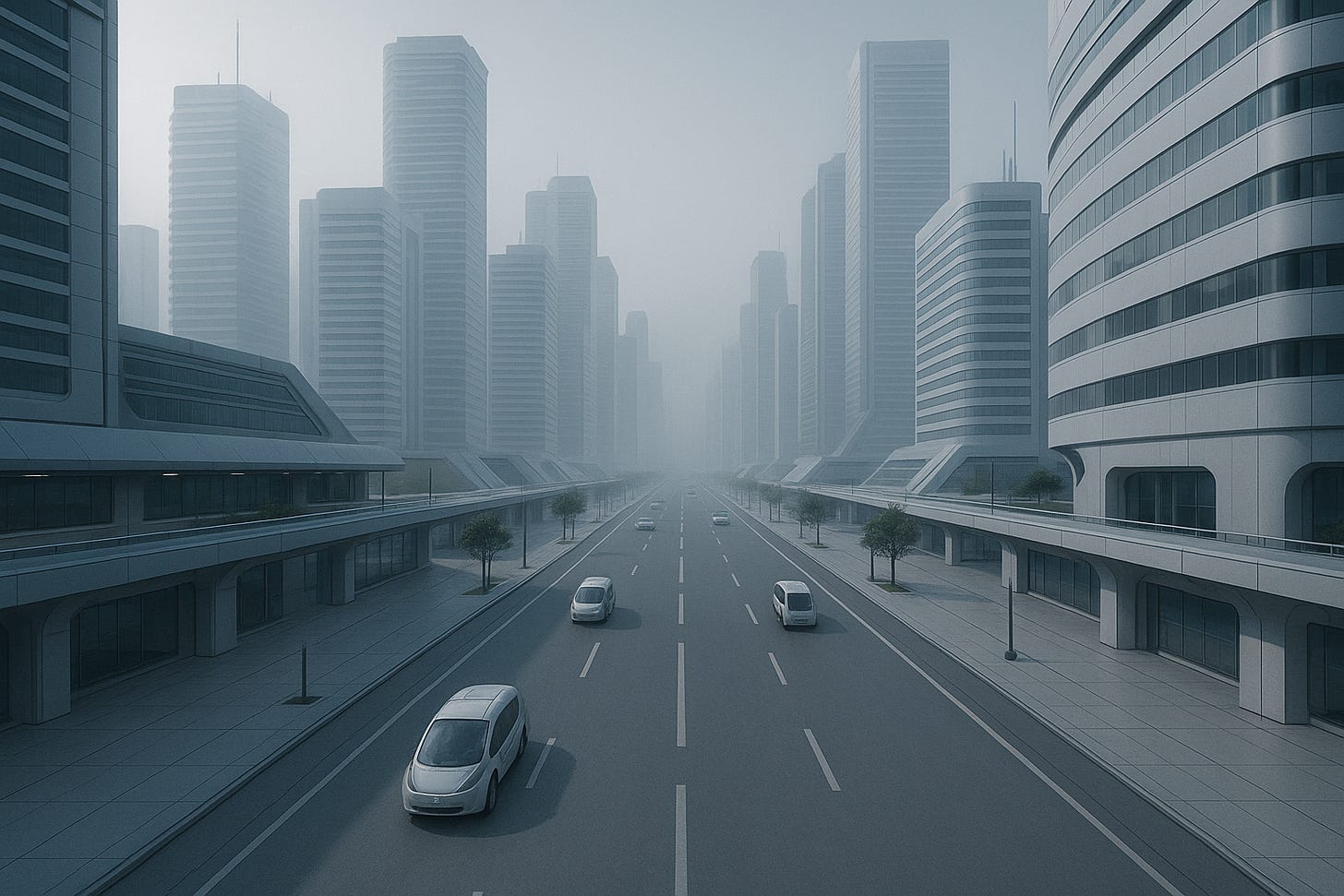
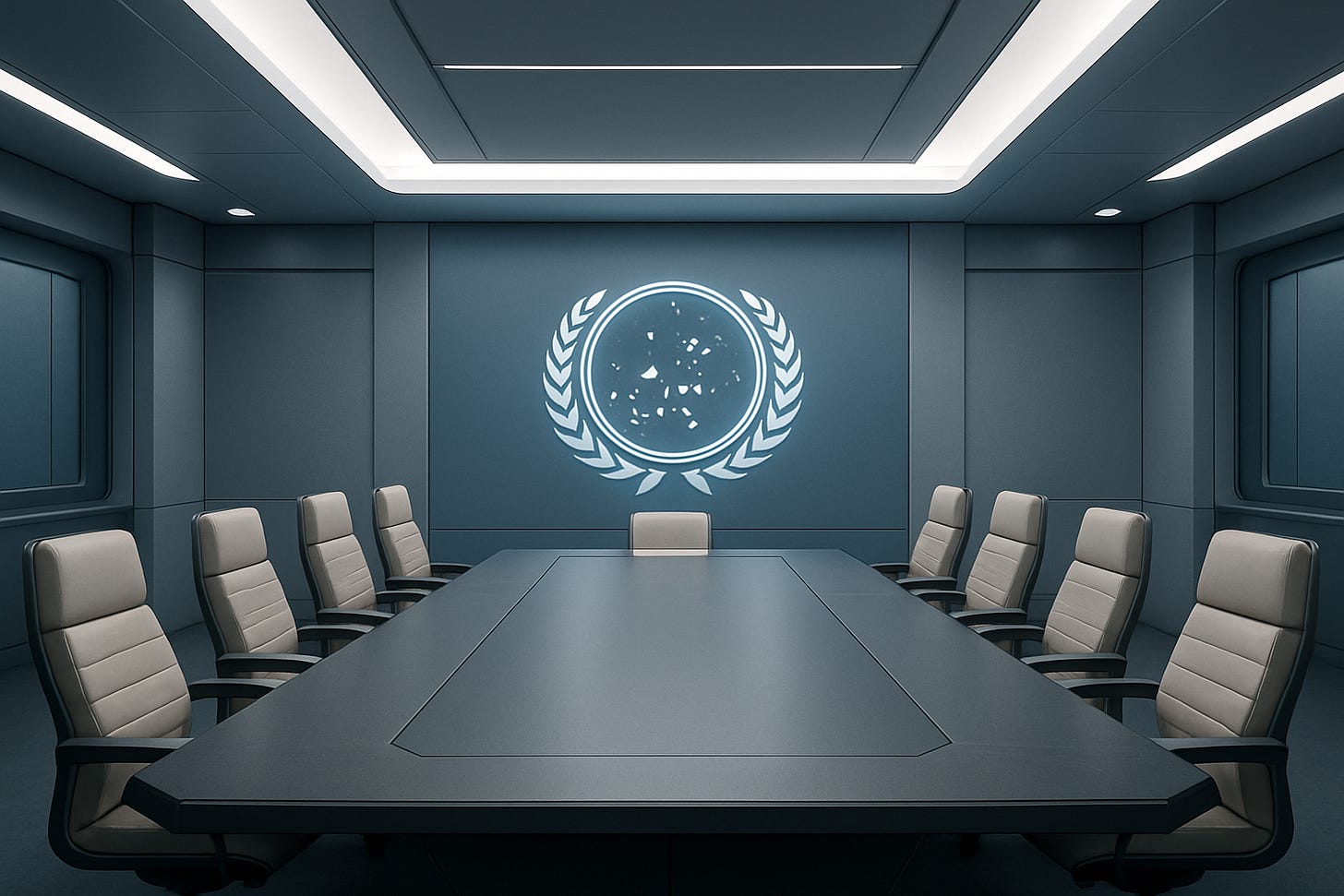

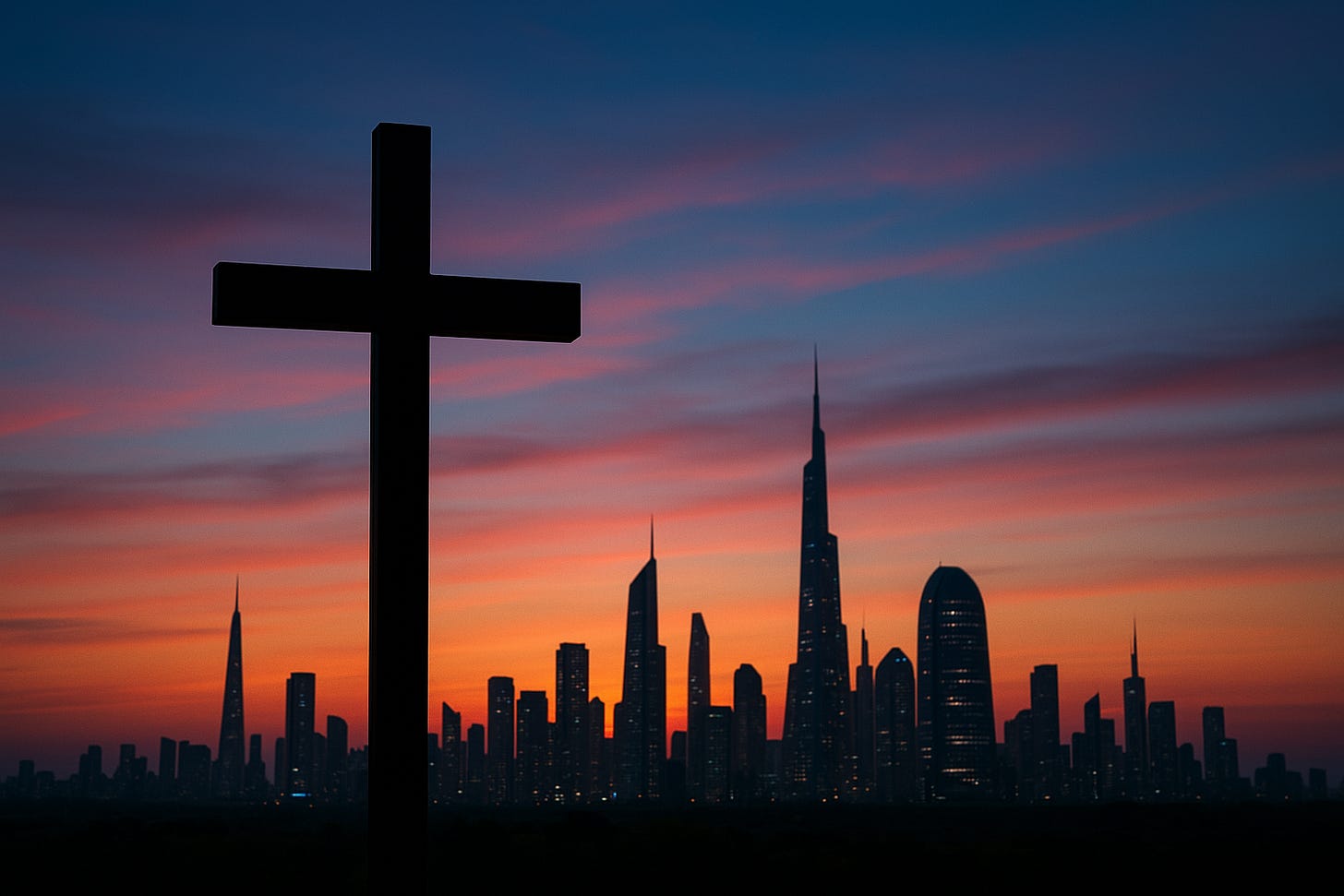
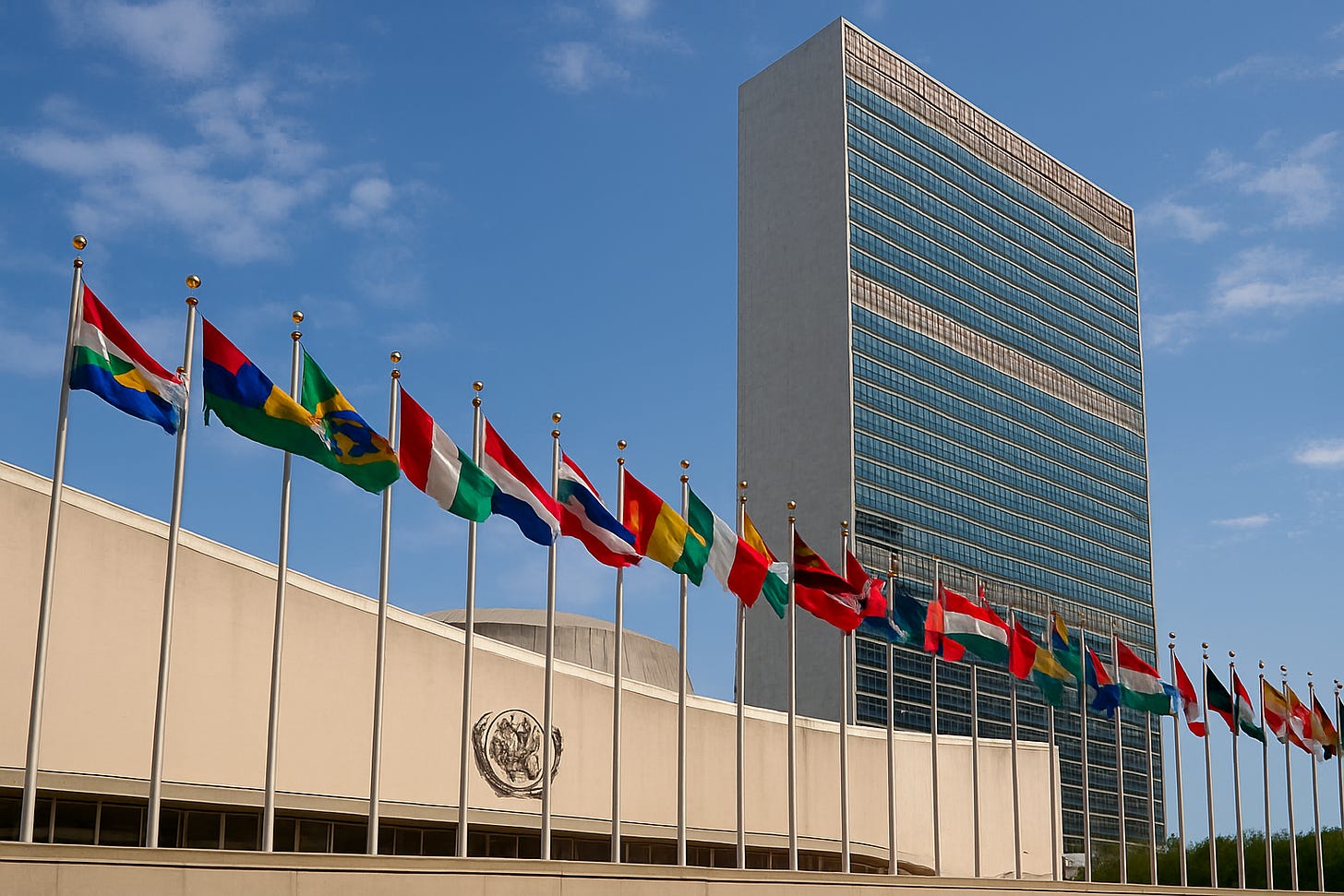
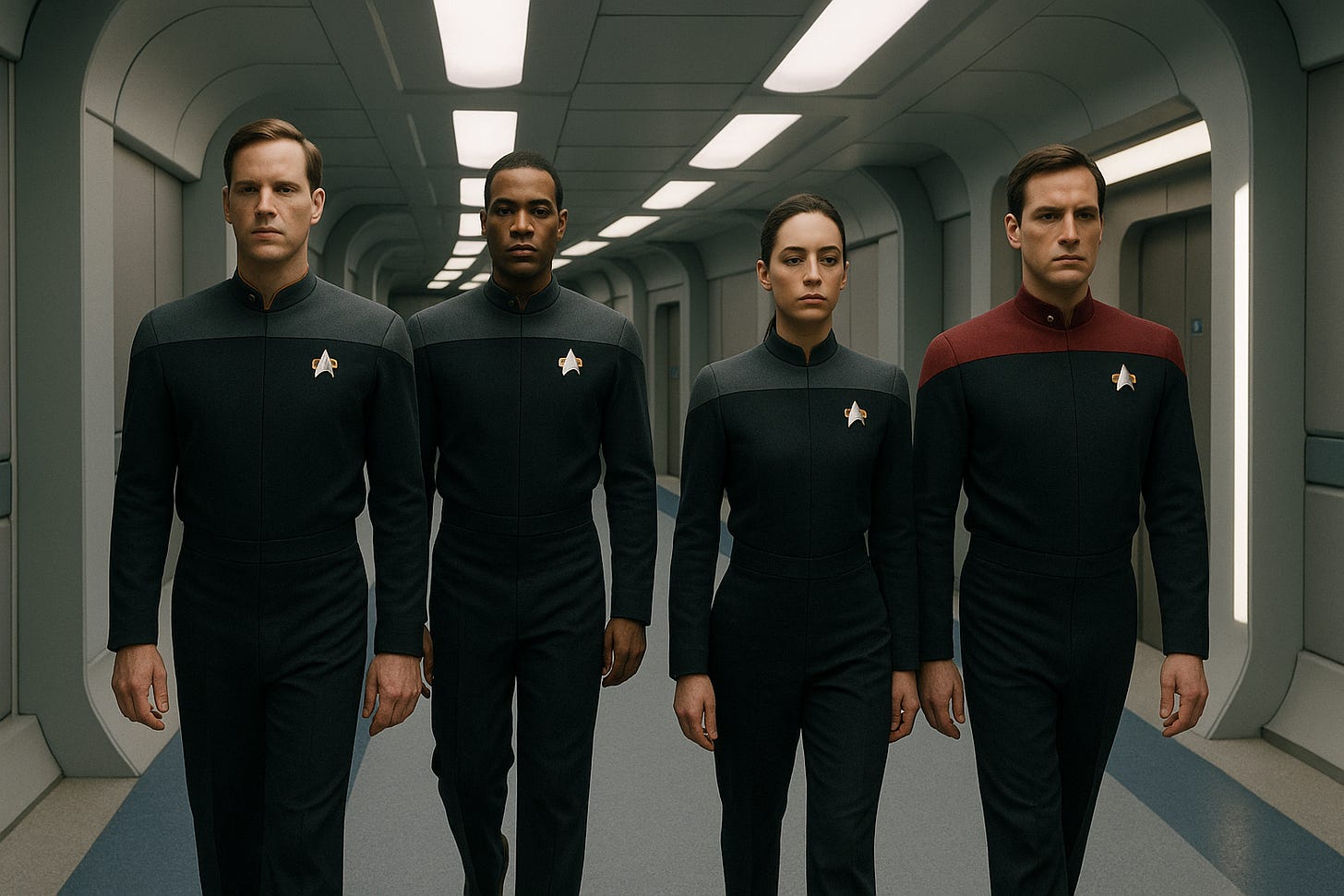
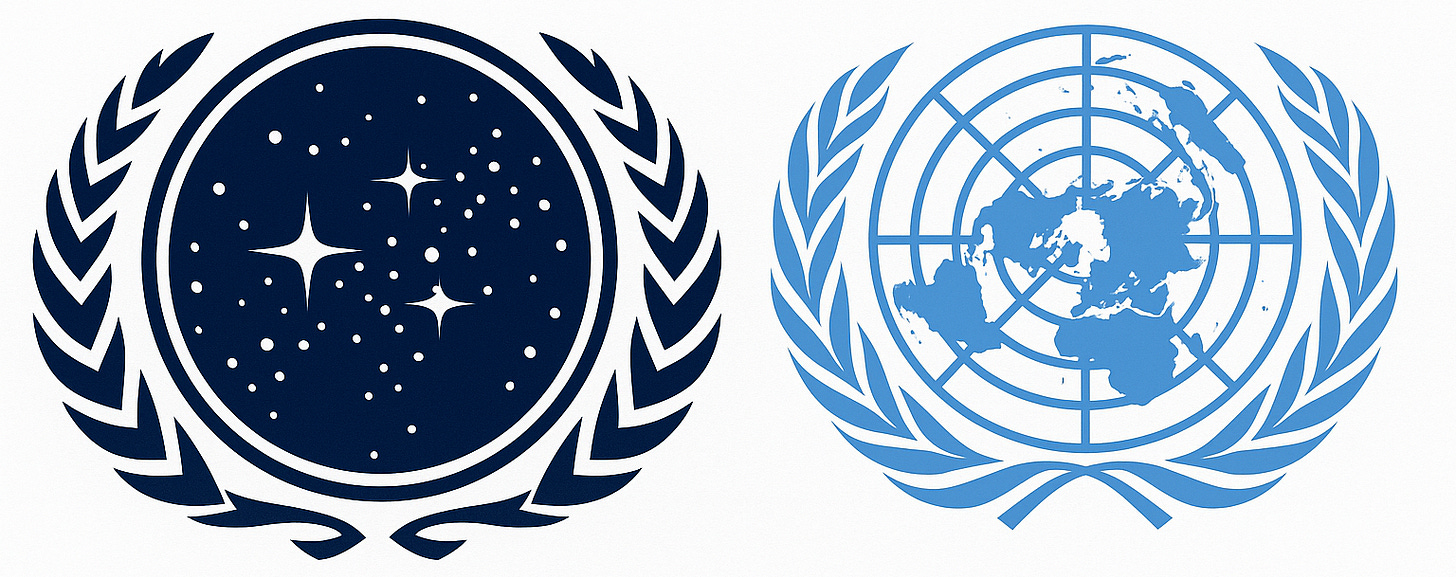

The UN is using the following phrase: "This clear and present global threat demands clear and coordinated global action." declaring Digital Free Speech a 'Clear and Present Danger'. In my opinion, the phrase "Coordinated Global Action" is just as concerning as "I'm from the Government and here to help".
Hi Michael, glad the post struck a chord. I’ll have to look into The Expanse — sounds like it might offer its own cautionary parallels.
I agree, Star Trek does have redeeming story elements. But as for the version of humanity it normalises — borderless, managed, obedient — I’ll happily leave that in fiction.